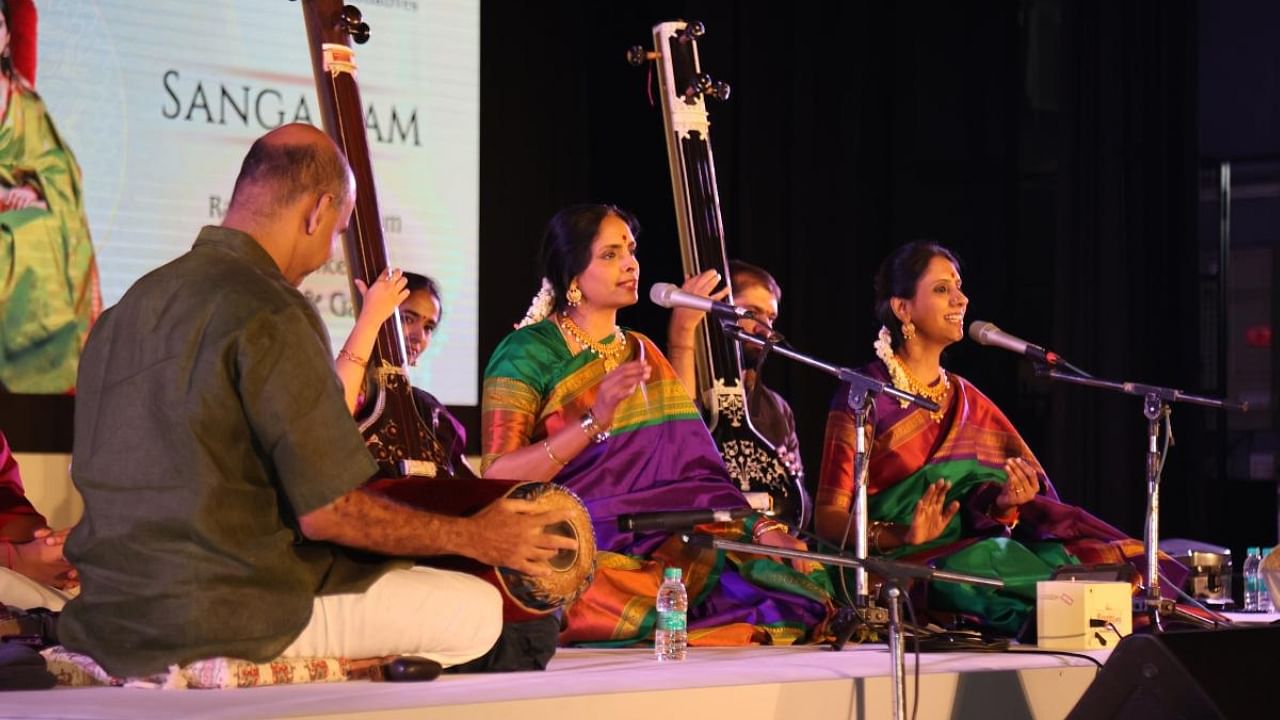
Acclaimed Carnatic vocal and violin duo Ranjani and Gayatri have enthralled music lovers for over three decades. Pitch and tala perfection, refined melody and impeccable voice control describe the music of the top-class sister duo.
In an interaction with Showtime at the SFPI’s Sangamam Concert Series recently, the classical musicians shared their thoughts on the evolution of Carnatic music and the challenges to keep this rich music tradition alive. Excerpts:
What are the challenges to keep the Carnatic classical tradition alive?
Gayatri: I think it requires maturity and mindset to listen to this music. The challenge is to distill the vast musical knowledge in the form of a two-three hour concert and that should resonate in everyone’s hearts. Some selfish elements in political circles appropriate the art form to their narrative, which is untrue and irrelevant. We should also take Carnatic music to the global platform. Many Hindustani musicians have achieved great success globally. I wish to see this happening through the right ambassadors.
Is any support from the government required to promote Carnatic music?
Ranjani: Carnatic music should be taught to kids at schools. There should be more performance spaces and the government must earmark certain areas just for art. They can organise more music festivals.
Gayatri: There are no world-class performance centres owned by the government. Most of them are run by private people. Some spaces are caught in bureaucratic red tape.
Is Carnatic music religion based?
Ranjani: Carnatic music is based on Sanatana Dharma. All our compositions are based on uplifting ourselves from the mundane. The whole concept of religion is from the western point of view but there are many religions under Sanatana Dharma.
Gayatri: Carnatic music is not just art-based music. You can call it religion, bhakti or spirituality but calling it only religious is Abrahamic. Religion is a very narrow term to define this music.
A few years ago there was a controversy on the Christianisation of Carnatic music…
Gayatri: All these unfortunate things will happen. Some mischievous elements will take and draw from our music. You see Christians taking our symbols. This is such a rich culture and people are there to rob the rich. I won’t blame them but we should defend ourselves.
What is your opinion on classical ragas being used in films?
Gayatri: Classical ragas have always been used in films. Each raga is uniquely interpreted in different genres. A raga is limitless.
Ranjani: After listening to Kantara’s Varaha Roopam song (The song uses Todi, Kanakaangi and Mukhari ragas), I am glad to say that there is a revival of the classical art form.
What is your take on fusion music?
Gayatri: Many artistes don’t agree to call their music a fusion though it’s a collaborative piece. They say it as a collective rock or power beat or use other terminologies. I can’t be judgemental as sometimes I feel let down by the music that passes off as fusion music though it completely draws elements from Carnatic music and does not do justice.
Do you see any competition from co-artistes?
Gayatri: We have never been in
that zone. My standards are higher than the set external standards. First, I have to satisfy myself. It is a struggle to meet up my own expectations.
Ranjani: Each one brings certain things to the performing art. Our fans can also like other artistes.
Is the Guru-Shishya tradition in music intact and relevant?
Gayatri: The forms of Guru-Shishya keep changing. One-on-one engagement of the guru and student is important. We also use technology to teach conveniently.
Which language is the closest to your heart in terms of singing?
Gayatri: Telugu is the sweetest language to sing. Sanskrit is like a mother to all of us. Tamil is our mother tongue so there is always a special joy to sing.